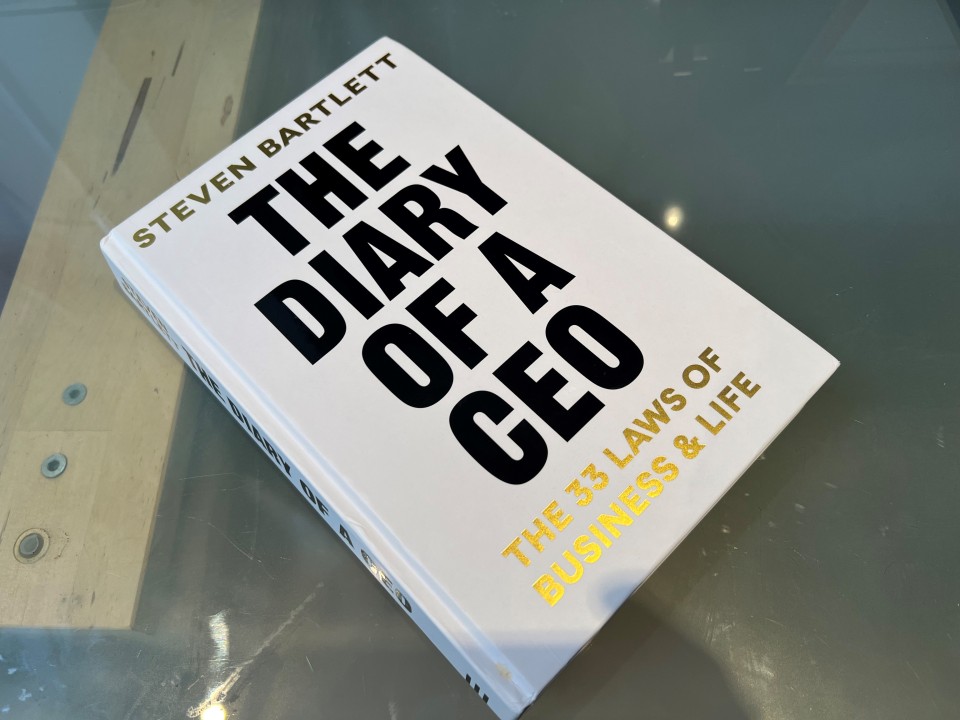Admittedly, I haven’t watched that many of Steven Bartletts “Diary of a CEO” video podcasts, and whilst I find the soundbites very interesting, haven’t invested the time to watch them regularly.
That is why, when I heard that Steven had collated advice not only from his personal experiences, but also those influenced by some of his previous excellent guests in the form of 33 categorised laws, I was intrigued.
Here are some takeaways from the book and some of my favourite (page turned down) bits.
Law 10 – Useless absurdities will define you more than useful practicalities
Steven recounts that spending £13,000 on a blue slide for the office caused results he hadn’t dreamed of. The blue slide came to symbolise a culture of innovation, new ways of thinking, energy, vibrance and fun, and become something that the media would fixate on. Interview after interview focussed on the unusual choice of office décor so much so, it led to a lot of new business. His company was starting to be known for having a blue slide in the office, rather than the great work they were doing.
Though this massive media coverage and interest opened doors in itself.
In my opinion this is the essence of marketing, selling the sizzle, not the sausage.
By this law, Steven is telling us that we may be remembered for something absurd and not necessarily how we intend to be remembered. If you are going to be remembered for something absurd, you may as well own it and use it.
Law 11 – Avoid wallpaper at all costs
This law resonated with me, as I see it all the time.
The overuse of popular terms to the extent that people filter them out. True “innovation” has suffered because of this, because every new or slightly different product or offering is hailed as a revolutionary innovation and every employee and business is expected to be “innovative”.
Before the latest product was “innovative”, marketers were saying they were “revolutionary”, these days it’s AI washing everything whether it is an AI infused car or an AI toothbrush. Claiming Artificial Intelligence in everything has become a mainstream practice and one with degrees of accuracy in reality. Whilst the terms themselves change, the overuse of terms to attract eyeballs continues.
Apparently our brains have become attuned and habituated to neutral faces on the internet, proven by Stevens experiment to use YouTube thumbnail images of peoples faces looking animated, threatening or scared, resulting in an increase in clicks.
I’ve always said that content and messages needs to grab peoples attention in the first few seconds else, the reader has bounced. Gone. Whilst MSN-esque clickbait can be crude and abhorrent (but effective), I still think ethical attention grabbing techniques can still be employed even today, often and especially in theatres they aren’t normally used such as commercial enterprise settings.
Make people feel something, either way
I love this quote, and the best marketers get this. In my opinion the currency of marketing is attention, and the enemy of marketing is apathy. If your messaging and marketing isn’t making people feel something, you’re wasting you’re time, the readers time and may as well be screaming into the void.
Law 12 – You must piss people off
I understand why Steven shares this. Both himself and many successful people with successful companies know that sitting on the fence is just a sure way of getting a sore bottom.
In this world you cannot please everybody, and I think we spend too much time and energy trying to sometimes. Surely it is better investing our efforts into delighting one audience, even at the cost of annoying another. Thinking you can please everyone is naïve.
Indifference – when people don’t love you or hate you – is the least profitable outcome for a marketer.
To be clear, I’m not an advocate of going out and being purposely offensive to get views or engagement. I draw the line there.
He also highlights the trend in book titles such as Calm the F**k Down and The Subtle Art of Not Giving a F*ck. They are an attempt to grab your attention and make you feel something. Whether you find them gimmicky or not (as I tend to – but that’s ok – I’m not the target audience).
Law 13 – Shoot your psychological moonshots first
Steven highlights techniques to please your customers by applying smaller psychological methods rather than making too many larger costly changes.
It’s nearly always cheaper, easier and more effective to invest in perception than reality.
This is a great technique that businesses can employ, it just requires investment into understand the target audience, how their minds work and Psychology 101.
A glimpse into how basic knowledge of human psychology can be beneficial can be found in Hooked by Nir Eyal.
Law 23 – Don’t be an ostrich
When an ostrich senses danger, it buries its head in the sand and Steven shares that humans often do just the same (metaphorically).
In business, the person with the fewest blind spots stands the greatest chance of victory
He reminds us that people aren’t motivated by seeking out pleasure as we generally believe, they are motivated by avoiding discomfort.
Comfortable and easy are short-term friends but long-term enemies. If you’re looking for growth, choose the challenge.
Teddy Roosevelt said..
“..who at the best knows in the end the triumph of high achievement, and who at the worst, if he fails, at least fails while daring greatly, so that his place shall never be with those cold and timid souls who neither know victory nor defeat.”
Summarising, Steven shares that his greatest mistakes weren’t where he took action, but when he decided on inaction or delay due to fear.
Law 24 – You must make pressure your privilege
Steven shares an interesting perspective – that pressure is a privilege and quotes Billie Jean King who said “Pressure is a privilege – it only comes to those that earn it”.
This was very much evident in the early days of Netflix (No Rules Rules book review), where individual performance and results valued to the extent that people were quickly replaced by better performers. Early Netflix was run like a sports team, fielding the best team to win, not a family to be carried or tolerated.
Law 30 – The three bars for building great teams
I’m not a football fan, but I enjoyed references to how Sir Alex Ferguson managed his very successful Manchester United team. Choosing to invest time into managing and leading the people rather than being prescriptive on improving skills/drills etc. His ex-players seemed to share the same view that he had a way of developing and getting the best out of players.
Steven talks about how all employees aren’t equal, there are bar raisers, bar maintainers and bar lowerers. You need to promote the bar raisers (showing everyone that excellence is rewarded) and fire the bar lowerers (removing toxic elements that can infect other people).
This concept of get good people on the bus and bad people off, you can always change peoples seats later was a fascinating concept I first read about successful businesses in Jim Collins Good to Great.
Law 31 – Leverage the power of progress
Yes! Not a completely original thought from Steven as he admits but an important law.
Much has been said about the rise of dominance from obscurity by the British Cycling team over the years that has been attributed to the marginal gain mindset introduced and popularised by Sir David Brailsford.
By making 1% improvements in a variety of seemingly unimportant areas, the cumulative effect was not only a rapid rate of improvement but also the introduction of the mindset of “this is working, what else can we marginally improve?” due to a collective feeling of progression.
This is the superpower of small wins.
I've mentioned this previously in my book review of Atomic Habits.
Law 33 – Learning never ends
This is something I feel very strongly about. You should never stop learning, because when you stop learning, you stop growing. And when you stop growing you are stagnating.
Cheekily but very true to form for the marketer that is Steven Bartlett, the last law just shows a QR code to an online signup form where users can provide their details about Steven’s future projects to do with learning.
Perhaps one of the biggest CTA’s I’ve seen... and entire book which results in a call to action to sign up to a newsletter! What else was I expecting from Steven! Lol.
I gladly signed up because I think I have more to learn from Steven.
Summary
There were plenty more gems in this book, I've chosen highlight just a few.
I shall place this rather highly on my all-time favourite book list. I think Steven has had the privilege of learning from many great thinkers and people with a range of experiences he’s interviewed, crafted his own approach to life and business and he manifests it well in this book.
Also, if you like this sort of book, you may want to check out my website GoodBusinessBooks.com which lists similar books about business, startups, entrepreneurship and personal development.
Take care!
-- Lee
















